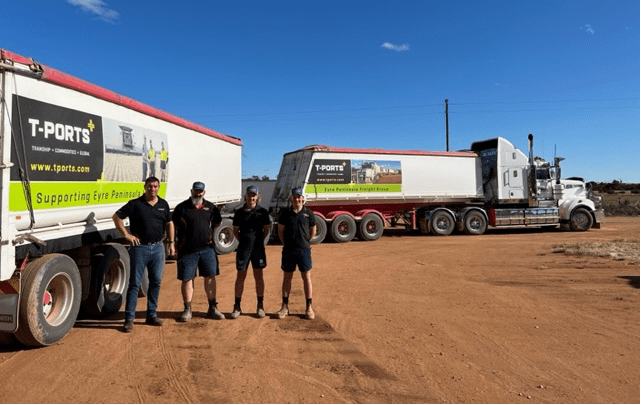
T-Ports’ Tim Gurney with ‘Bulldog’, Lachlan and Seth Gregory and one of the family’s trucks. Photo: T-Ports
EYRE Peninsula Freight Group has signed a multi-year agreement to haul for independent South Australian bulk handler and terminal operator T-Ports.
EPFG members are local carriers across the EP who started working alongside T-Ports in 2019, when it opened its first sites at Lock and Lucky Bay.
Since then, T-Ports has opened sites at Kimba, as well as Wallaroo on Yorke Peninsula, where its second export terminal after Lucky Bay is being built.
“This agreement places significant revenue directly back into regional towns across the EP, with around 30 truck-driver families involved with EPFG all living in regional towns,” T-Ports business development and client relations manager Tim Gurney said.
Mr Gurney said the deal is expected to be worth about $65M, and provides surety of business to EPFG members, including Kirsty and Daniel “Bulldog” Gregory and family in Kimba, without locking them into tonnages or a flat rate across sites and seasons.
Mr Gurney said the agreement came out of a conversation back in 2019 with Mr Gregory, whose business has grown from four to nine trucks in recent years.
“He wanted to grow his business and we wanted to grow ours, and through his coordination, he got together the other operators that have helped us get to a high volume.”
Mr Gurney said prior to that, T-Ports’ work for local transport operators was inconsistent based on whether or not a vessel was coming in to load.
“In the first three years, we were a less mature supply chain, and the freight support had to stop and start; now we’ve got a high volume going through the supply chain.”
T-Ports relies on road alone to deliver grain, with EPFG carriers moving 35 percent of grain delivered, or 150,000t, from farms to T-Ports sites during the 2022-23 harvest, and growers delivering the balance.
EPFG members are now in the process of moving at least 800,000t of grain to port in readiness for export via the MV Lucky Eyre transshipment vessel.
“We’ve invested heavily in local towns via contractors and our part in lifting value to grain growers to ensure their product is now front and centre on world-stage parity.
“T-Ports has brought the port to the product, saving grain…what was otherwise a long trip to traditional ports, reducing millions of kilometres travelled, carbon emissions and traffic congestion in city streets.”
T-Ports has been funded solely by private Australian investors, and has spent around $130M in the past five years on EP.
Source: T-Ports

HAVE YOUR SAY